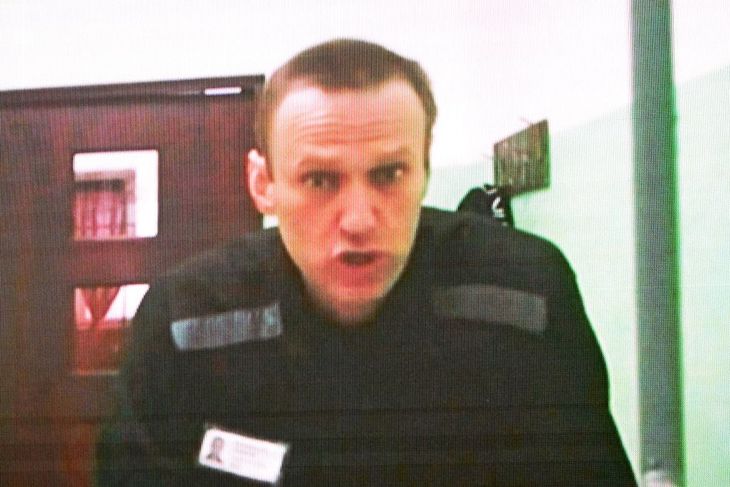Alexei Navalny – the most high-profile figure of Russia’s political opposition – has just been sentenced to 19 years in a ‘special regime prison colony’. This was no surprise.
Navalny himself predicted the ‘Stalinist’ sentence for a variety of criminal charges, some relating to ‘extremism’, in a blog post the day before the sentence was handed down: ‘The formula for calculating it is simple: the prosecution’s request minus 10–15 per cent. They asked for 20 years, so I’ll get 18 or something.’
This latest verdict adds prison time to the sentence he is already serving in the Melekhovo prison colony – around five hours east by car from Moscow – which also served as the location for the latest court proceedings that were held behind closed doors.
Defiance has become a hallmark of Navalny’s approach
Conditions in the Melekhovo prison colony are bad enough: some have referred to it as a ‘torture conveyor belt’. But ‘special regime prison colonies’ are even worse, with yet more restrictions on prisoners’ lives, including regarding the number of visits that can be made and possible bans on cellmates talking to each other. And still more years could be added to Navalny’s time behind bars, with a separate ‘terrorism’ case also in the pipeline.
The message from the authorities is clear: Navalny will remain in prison for at least as long as Vladimir Putin remains alive and in charge. But, even in the face of legal punch after legal punch, Navalny remains defiant. In the same blog post, Navalny said that, despite the aim of the sentence being to ‘startle, bewilder, intimidate, and disabuse [Russians] of any thought of resistance’, people could resist by not letting themselves be ‘intimidated’.
This defiance has become a hallmark of Navalny’s approach, developed during his work as an anti-corruption activist, politician, and protest leader. Slick videos put together by his Anti-Corruption Foundation (FBK) and posted on YouTube have detailed high-level corruption in the Russian elite and helped him build a following.
But the threat to Putin’s political system became too much. The authorities cracked down on Team Navalny, especially after his return to Russia in January 2021, following treatment in Germany after poisoning by the nerve agent Novichok. This repression was a precursor to the crushing steps taken against dissenting voices in Russia following the country’s full-scale invasion of Ukraine.
Vladimir Putin has yet to mention Navalny’s name in public – but this very fact suggests the central place the opposition figure holds in the Russian president’s mind. Even if we can’t get direct insights into Putin’s thinking, it’s clear that the Kremlin increasingly saw Navalny, his team, and his movement’s activities as a dangerous thorn in their side.
It’s important, though, to be clear regarding Navalny’s popularity level inside Russia. Polling by the independent Levada Center in February 2023 revealed that only nine per cent of respondents approved of his activities, down from 14 per cent in February 2022 and 20 per cent in September 2020. That being said, the context is crucial: Navalny has been portrayed and pilloried by Russian state media for years as an agent of the West, his visibility decreased markedly following his 2021 imprisonment – and there are many reasons to treat with caution polls conducted in an authoritarian state, especially during a time of war.
But it’s likely that the Kremlin was never chiefly concerned by the prospect of Navalny commanding majority support in Russia. Rather, the challenge Navalny has posed is the offering of an alternative in a political system predicated on there being no alternatives. Navalny has provided a charismatic challenge to the dull – albeit dangerous – inevitability of Putin.
At the same time, we shouldn’t ignore the many criticisms levelled against Navalny, including those from Ukrainians who condemn Navalny’s past statements about Ukraine – even as he himself condemns Russia’s war on the country – or those who criticise the FBK’s focus on elite corruption, rather than tackling Russian imperialism.
Navalny is a complex character. But that shouldn’t prevent us from condemning his treatment by the Russian state. The Kremlin will see the latest verdict against Navalny as a key step in its plan to keep him out of public view – to neutralise any threat he poses, including in the minds of those who do, or might, support him. State media has remained virtually silent on the sentencing.
As the list of political prisoners in Russia grows – including Vladimir Kara-Murza, Maria Ponomarenko, and Ilya Yashin – Navalny’s response to Putin’s ‘fear dictatorship’ is disarmingly simple: Russians should refuse to be afraid. But whether that is possible remains to be seen.






Comments